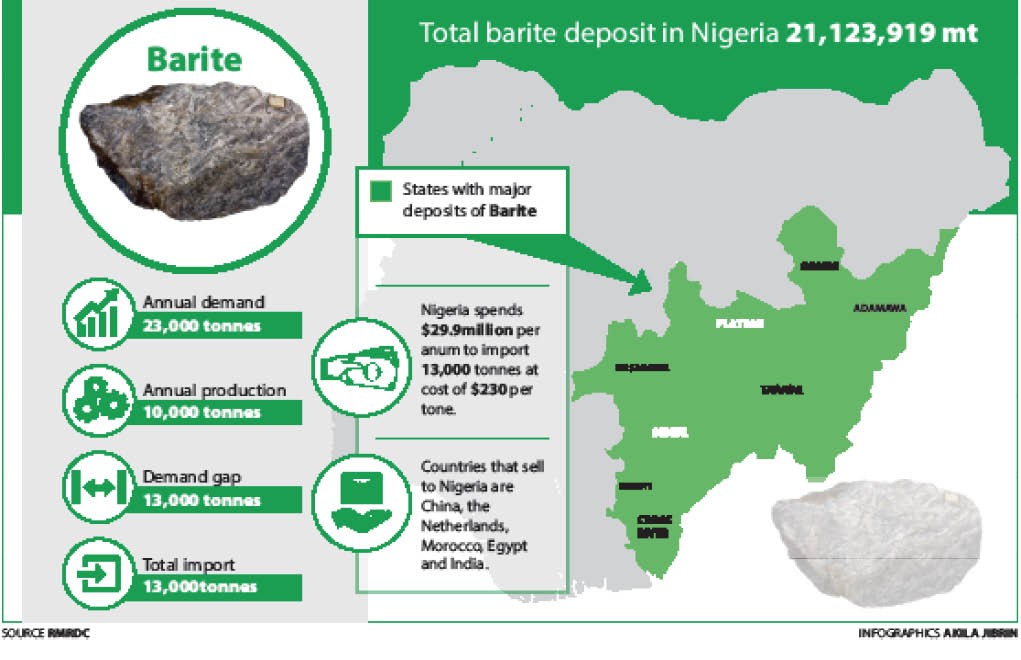Despite huge deposit, Nigeria spends millions on barite import
Despite abandoned barite deposit in Nigeria, the country still spends about $29.9 million to import 13,000 tonnes of the mineral resources annually to meet the consumption gap, a document from the Raw Materials Research and Development Council, has shown. Barite is the primary ore of barium, extracted to make a wide variety of barium compounds. […]

Despite huge deposit, Nigeria spends millions on barite import
Despite abandoned barite deposit in Nigeria, the country still spends about $29.9 million to import 13,000 tonnes of the mineral resources annually to meet the consumption gap, a document from the Raw Materials Research and Development Council, has shown.
Barite is the primary ore of barium, extracted to make a wide variety of barium compounds. Some of these are used for x-ray shielding. It is used to make high-density concrete to block x-ray emissions in hospitals, power plants, and laboratories.
It has high application in the oil and gas industry.
A document obtained from the Council shows that Nigeria has a reserve estimate of 21,123,919 MT of barite with Nasarawa, Plateau, Taraba, Adamawa, Benue, Plateau, Cross River, Ebonyi and Gombe states having the major deposits.
But despite this abundant barite deposit, the country produces only 10,000 tonnes and consumes 23,000 tonnes, leaving a deficit of approximately 13,000 tonnes.
“As a result, Nigeria has had to rely on imported barite from China, the Netherlands, Morocco, Egypt and India. Available statistics indicated that Nigeria imports 13,000 tonnes annually and with a tonne, costing $230, this amounts to an annual expenditure of $29.9 million for barite importation,’’ the document indicated.
Reasons Nigeria is not doing well in barite production
The Director-General of the Raw Materials Research and Development Council, Professor Ibrahim Doko Hussaini, said the major challenge militating against barite production in Nigeria is underdevelopment of the mining sector. This, according to him, made the sector to contribute only a meagre 0.3% to national GDP and the country to constantly depend on minerals importation from other countries.
“Barite is among the 34 minerals deposits identified in Nigeria. All ownership rights of mineral resources belongs to the federal government and it reserves the power to grant permission to registered mining companies to explore, mine and sell mineral resources.
“The challenge which generally affects the mining of various mineral resources also affects the mining and beneficiation of barite in Nigeria. Some of the challenges the mining sector is facing is lack of investment in barite mining,’’ he said.
Why Nigeria should invest in barite production.
With more action on barite production in Nigeria, the country can save about $29.9 million being spent on barite importation annually.
According to Professor Hussaini, in view of high application in the oil and gas industry, the global barite market size was USD 1.55 billion in 2019. This, he added, was expected to increase at a compound annual growth rate (CAGR) of 3.8% from 2020 to 2027. From 2016 to 2019, the consumption of barite spiked sharply in the United States by more than 80% owing to a significant increase in rig counts, particularly for offshore drilling, in most of the leading oil and gas-producing states. This shows a huge market for barite which the country can tap from.
Nigeria’s efforts to encourage barite production
To obviate the problems associated with mining and beneficiation of barite in Nigeria, successive governments at the federal level have been making efforts towards improving the performance of the barite subsector. For instance, the Nigeria Content Act of 2010 campaigned for increase of local content in Nigeria’s oil and gas industry. The Act stipulates that 60% of barite utilisation in the country should be sourced locally.
The Raw Material Research Development Council over the years has put in place plans and strategies to boost local production of barite in Nigeria in order to stem import dependency. The Council has characterized samples of barites from most of the deposits in the country. Also the Council is working on promoting the beneficiation of low grade barite by using techniques such as gravity separation, floatation and magnetic separation techniques in collaboration with reputable equipment fabricators in the country. This is to promote upgrading of the low grade barite to meet up with the API requirement for oil and gas drilling.
In addition, the Council is in collaboration with stakeholders in the petroleum sector including the Petroleum Development Trust Fund (PDTF) and the University of Ibadan for the development of Barite as drilling mud weighing agent. The project is looking at the impact of Nigerian Barite and Ilmenite on enhancing the drilling mud weight in Oil and Gas industry.
In an attempt to address identified gaps in barite demand and supply, the Council convened a stakeholders meeting to work out modalities on increasing barite mining and to further upgrade the quality of barites produced locally. At the meeting, the stakeholders noticed the need for government agencies to synergise and find solution to the challenges in the sector.
In addition to the above, the Council is establishing a minerals testing and certification centre at the African University of Science and Technology, Abuja. Miners can now be able to know the grade of their minerals before putting them in the market. This will enable them to charge appropriate prices for their commodities.
